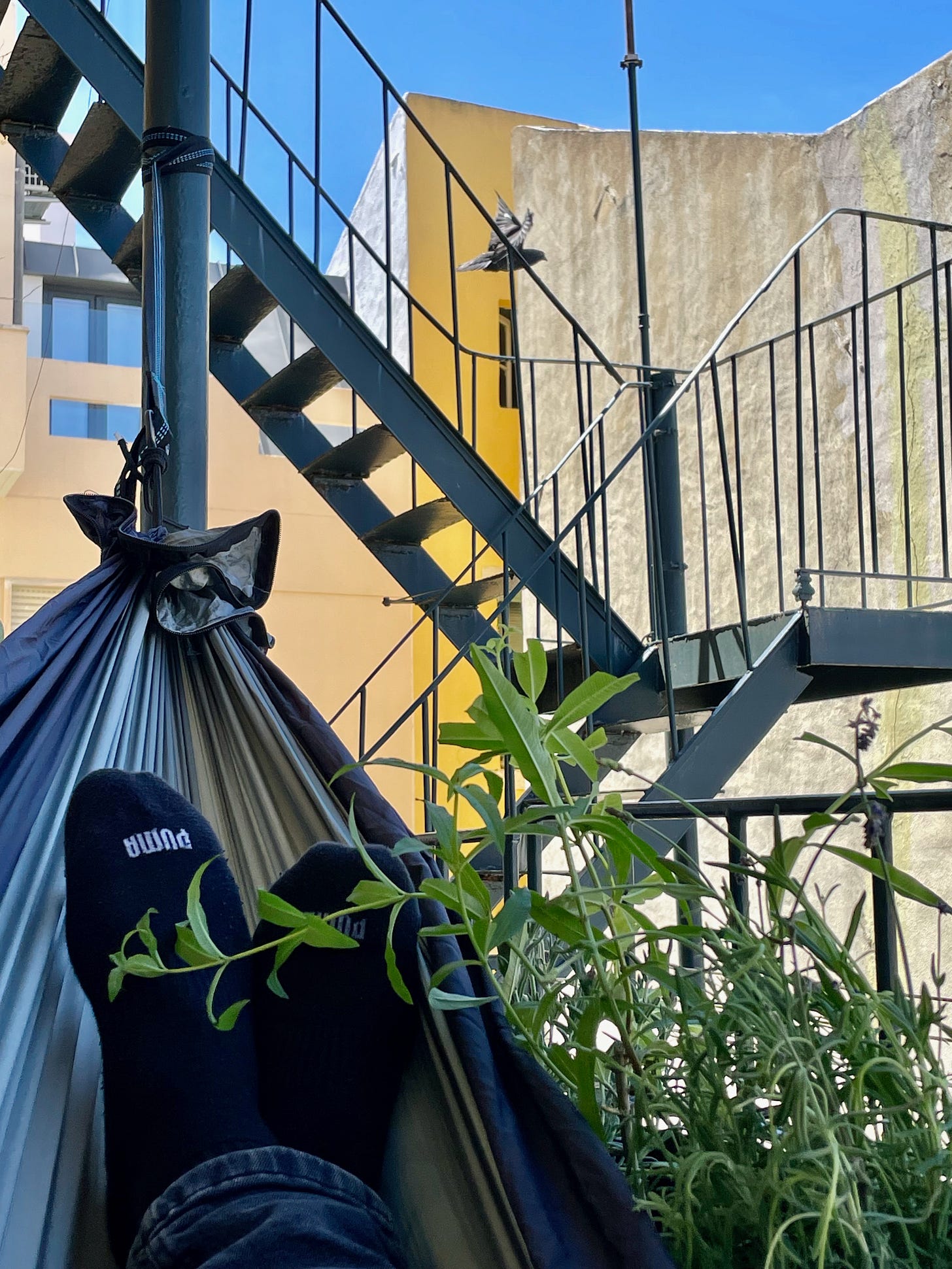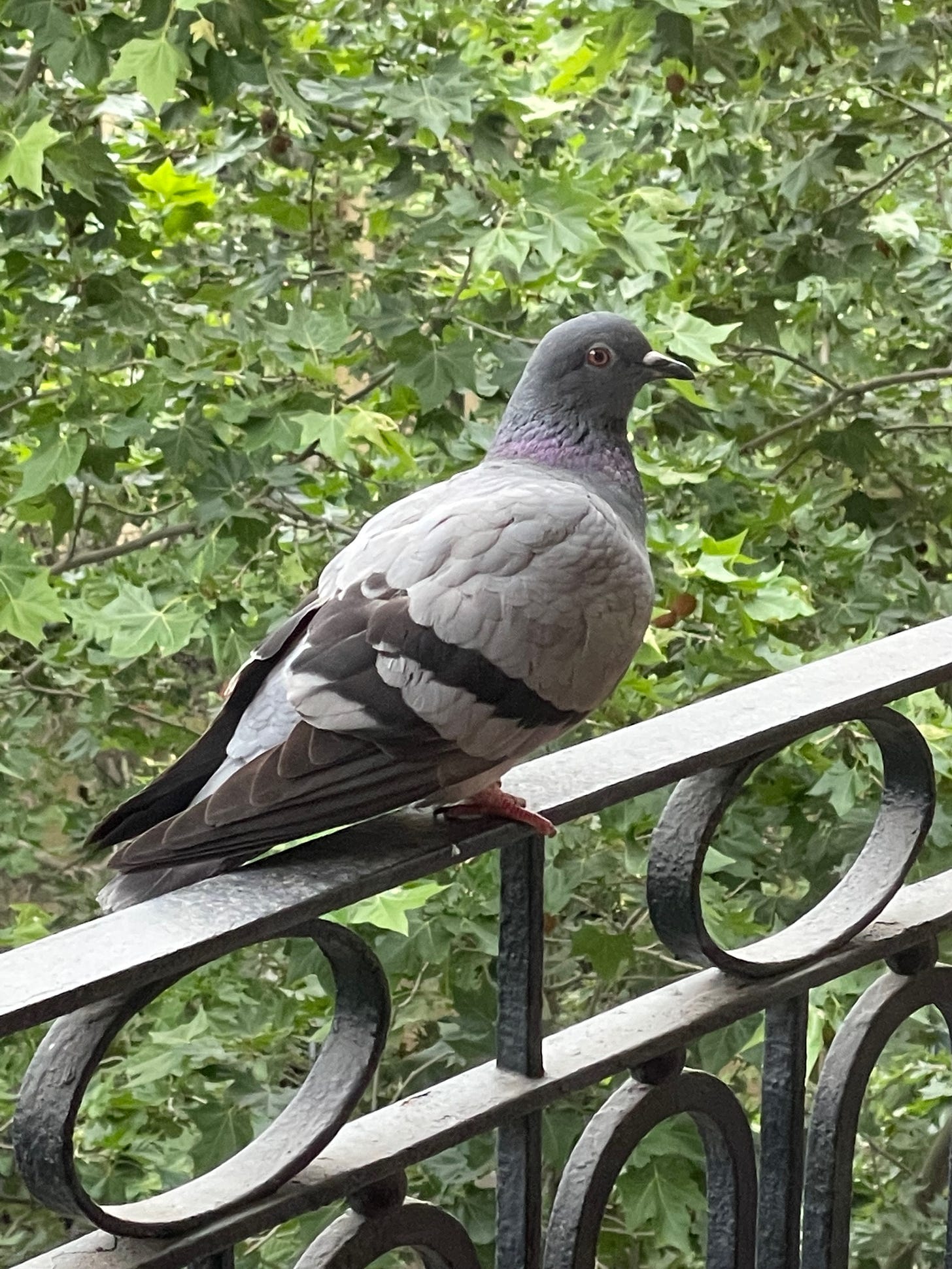“Clarissa”
A true story
One thing that was right, between us, was that we both loved animals. In July, Liza and I spent nine days reading books under the pine trees by the Croatian seaside, communing with the cicadas and with the lizards, who were endlessly curious about us. I decided that for the sake of expediency, all of the blue lizards would be named Hector, and all of the green-brown ones would be named Carlos. I have a facility for picking names for animals, though I couldn’t really tell you where they come from.
After that holiday under the Adriatic sun, we decided that it would be our last. After nearly four years together, including a whole year of continuous travel, we threw in the towel and acknowledged that we were just too different as individuals to be able to live together in harmony. This decision came at an awkward moment, in that we still had three thousand kilometers left to drive, to get back to our new home in Lisbon. Which would soon become our old home in Lisbon.
The drive—six days with programmed stops in Tortona, Arles, Barcelona (two nights), and Alcalá de Henares—went remarkably well. We found that sitting side-by-side in the Skoda actually provided a forum for slow, simmering discussion of what had happened to us, and of what we wanted to see happen in the future. Like soup, it was soothing. In a nostalgic mood, we went to Quimet & Quimet, Cal Boter, and our other favorite restaurants in Barcelona.
When, at the end of the sixth day, we arrived in Lisbon after a full month’s absence, we found our apartment in good shape—we had left our plants with friends—but noticed a Jackson-Pollock-like design on the floor of the rear balcony, made of bird droppings. “Oh great, pigeon shit!” grumbled Liza.1 She went inside, leaving me to investigate. I looked up at the large drainage pipe running over the door to the balcony, which was covered with anti-pigeon spikes that had surely been put there decades ago. These were still in place, but clearly a bird had been able to get up there somehow. Feeling exhausted and uncreative, I got out some masking tape and made a half-assed spiderweb of tape over the area, so that it resembled an avian crime scene.
We cleaned up the pigeon poop, but the next morning, there was a fresh supply, in the same place. I felt flummoxed and generally overwhelmed by everything that was happening in my life, so I did nothing.
Later that evening, as were were sitting on the balcony sipping cold beer to ward off the throbbing heat of the Portuguese summer, we heard a flag-like flutter and a sound like a squeaky toy, gently tapped. A lone pigeon, small and rather dark, landed on the pipe and slowly, meticulously made its way behind the tape, behind the spikes, to a position right over Abstract Expressionism Ground Zero. We stood up and looked at her, and she looked back at us, as if to say, “What?” Liza and I looked at each other, shrugged, and sat back down to our beer.
Without really discussing it, we fell into a decision that evening—like our final swim in the Adriatic—that was probably fueled by our weariness, the recent memory of Carlos and Hector, and the impending specter of loneliness in both our lives. We just put some newspaper down on the floor and went inside.
I named her Clarissa. I can’t say why. A strange name, to be sure, for a rather dark pigeon, which might actually be male. But I think I sensed it would be impossible to have any antagonistic feelings toward a bird named Clarissa. This turned out to be correct.
Clarissa would show up like the most regular of commuters, arriving at sunset, always alone, and leaving at first light. I removed the crime-scene tape that was only serving to make the place look junky. We traded out the newspaper for a towel once we realized that the paper was easily blown in the wind, turning into flying shit tacos that swirled around the kitchen. The towel was less hygienic but more manageable.
I started to look forward to Clarissa’s arrival every evening. Especially when Liza and I had been quarreling all afternoon, I felt a sense of rebirth, of encountering something pure, when she arrived, settled into her nook, and looked down at me with her inscrutable face, her amber eyes dark in the gloaming, the white cere over her bill luminous. I made a point of greeting her when she arrived, and of saying good night to her when I finally propped the doors open to catch the night breeze. It was clear that she could have come into the house, but it was equally clear that she would not. We had a satisfactory arrangement.
Only once did she get spooked, when I dropped a clothespin while hanging laundry, watching it spiral down the four stories towards the neighbor’s courtyard. The sharp intake of breath provoked by this flight provoked in turn another flight: Clarissa let out a burbling whistle and launched herself through the air towards the neighboring rooftop, where she sat looking utterly confused.
As a matter of fact, Clarissa was not the first pigeon that Liza and I had befriended. Two summers earlier, on that same Croatian island (which Liza’s family has been going to for what feels like centuries), there had been a terrible drought. We arrived to find the vegetation turning brown, the cicadas singing a dismal song, and the lizards acting lackadaisical. Locals said that there had been no rain for over a hundred days.
I was sitting on the balcony one afternoon, trying to conjure a stiff breeze into being through sheer desire, when a pigeon landed on the railing. He was a very large and handsome pigeon, but the way he bobbed his head suggested that he was in distress. I did two things: I got a pitcher of water, and I named him Ben.
Ben was terribly thirsty but skittish. Liza helped me devise a method for giving him water: There was a red tiled roof below our balcony, and we would pour water from a cup into one of the grooves between the tiles. It would trickle down the roof, and Ben would position himself to intercept it. He drank with evident delight. This became a daily ritual, and is one of the things I remember most clearly from that holiday.
Nevertheless, I, being someone who is given to visualizing multiple scenarios (as I would put it), or catastrophizing (as Liza would put it), worried about what would happen to Ben when we left the island after our nine days there. I briefly considered writing up instructions for the next tenants of the house, explaining how to water the pigeon, but I realized that this is an area in which Liza and I differ from most other people. I just had to hope for rain.
And two years later, in Lisbon, I started to think about what would happen to Clarissa once we moved out of the apartment. Drafting and leaving behind a white paper on optimal human-pigeon relations was clearly a non-starter. Nobody would want her there at her little post above the door once we were gone, producing her shit-on-textile masterpieces. And so the comfort I derived from communing with our feathery tenant was made bittersweet by a dose of apprehension.
And then came the day, a few weeks later, just as Liza was packing to leave for the trip to Scotland that we had been planning to take together, when I stepped out onto the balcony just after sunset and looked up to see that Clarissa was not there.
Imagine this: A grown man crying because there is not a pigeon on his balcony. It took me by surprise. I had hardly cried at all during the many weeks of our protracted break-up, but just as I was preparing to watch Liza set off on “our” trip all alone, I was confronted with this extra loss, and it sent me over the edge.
Rationally speaking, it is absurd to equate the departure of a pigeon with the dissolution of a relationship between lovers. But this was a simpler pain, and easier to feel. I sat down and cried.
Every evening, Liza would text me from Scotland to ask whether Clarissa had returned, and every evening I replied that, sadly, she had not. The embarrassment that I felt was greater than the grief. How can a sensible adult mourn the migration of a wild animal? But it was the concomitant question that terrified me: Is this man going to survive on his own? Or is he so ill-suited to the world that he will shrivel up and die like a dragonfly in a drought?
To add to my embarrassment, I caught myself staring creepily at all the pigeons I came across in the neighborhood. But let’s be honest—distinguishing pigeons is not easy, so I just wandered around like a disorganized voyeur.
But then, gradually, the tide turned. Every day, as I stepped outside at dusk to check the roost, it became less surprising and less painful to see it empty. And every time Liza texted me to ask about Clarissa, I felt the love and the understanding behind that act.
As I went through the kitchen drawers, sorting what was mine from what was hers, meticulously disassembling the nest we had built together, I mused that maybe little losses teach us about big losses. Clarissa had turned up at just the right moment in my life to give me something. At first, I thought it was a temporary sense of serenity—but that wasn’t it. What she gave me was practice at saying goodbye—saying goodbye with grace and optimism. As I packed up a potato peeler, a phrase came to me: Love outlives loss.
I folded Liza’s laundry and put it in the room that was now hers. If I was grateful to a dark blue bird for the weeks we shared a balcony, how should I feel toward this wild and caring soul for the years we shared a life? Maybe she too was simply ready to go, and the best thing I could do was say goodbye, understanding that separation need not mean the death of love. She would be all right. I would be all right.
And there would always be more pigeons.
Since I know how much it matters to her, I’ll point out that Liza is pronounced “leeza” (rhyming with Pisa) rather than “laiza” (rhyming with Pfizer).






This came to me at a time when I really needed it. Traveling by myself in Spain after an extended breakup with a partner I lived with. Here I am, soft music in a Barcelona coffee shop, heart warmed and eyes teary, reading about a man, a pigeon, and what it taught him about life. Thanks for sharing this, and providing a bit of comfort at a moment where that feels hard to find.
Thank you for sharing your vulnerability with us. Love does outlive loss, and it is worth the pain